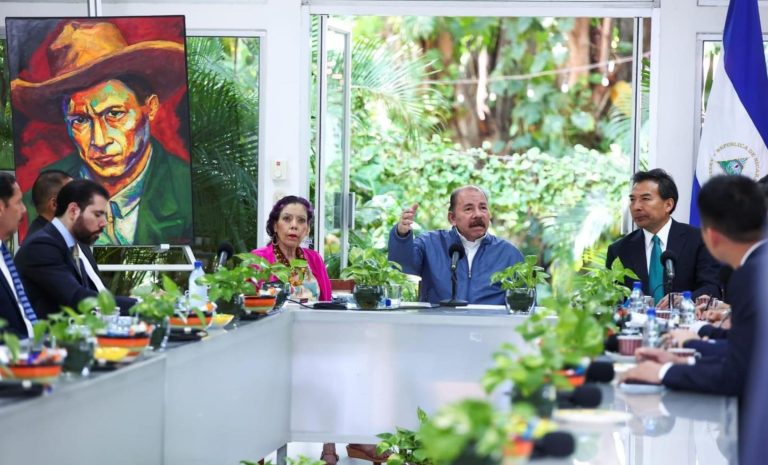17 de abril 2023

Children of Exile: The Births “Sowing Hope” in the Camp of Nicaraguan Farmers

PUBLICIDAD 1M
PUBLICIDAD 4D
PUBLICIDAD 5D
“Let them pass us the list and we will send them there,” said the dictator in reference to his political prisoners. He also attacked Monsignor Álvarez

Daniel Ortega during a meeting with the head of the Chinese Agency for International Development Cooperation, Luo Zhaochi. Photo: Presidency
“We have been patient, and then began to capture those who were already organizing plans to plant bombs and organize attacks (…) we had more than 200 prisoners, who they called political prisoners, who were nothing more than terrorists; So in February, since the United States is the one that yells the most for the political prisoners, we told them to take them away, there they are, they sent a plane and 222 left, and now they are inventing that there are more political prisoners, I tell those governments together with The United States send us the list and we are going to send them there,” he said.
A total of 222 political prisoners in Nicaragua were exiled at dawn on February 9, unilaterally, by the Ortega dictatorship. Among those released were prisoners who had been in the La Modelo and La Esperanza prisons for more than two years, and those who had remained in the El Chipote prison and others under house arrest for more than 600 days.
Since then, the regime has kept more than 40 political prisoners in the different prisons of the country, among them the bishop of Matagalpa and apostolic administrator of the Diocese of Estelí, Monsignor Rolando Alvarez, who is being held in La Modelo prison.
According to the Blue and White Monitoring only during Easter Week, another 21 people were detained, between April 1 and 9, three of whom were released the following day and 18 continue to be locked up.
New attack on the Catholic Church
Ortega took advantage this Saturday of a meeting he held, in Managua, with Luo Zhaohui, president of the Chinese Agency for International Development Cooperation to again attack the Catholic Church and the bishops of the Nicaraguan Episcopal Conference once again, whom he called spokesmen for imperialism. He condemned Monsignor Abelardo Mata and Rolando Alvarez, whom he sentenced to 26 years in prison after he refused to be exiled from the country.
“They had some spokespersons like the famous bishop of Estelí, whose name says a lot, Monsignor (Abelardo) Mata. He was one of those who openly attacked the government when we were in the consensus era (until 2018). He was another Bishop, like the one from Matagalpa (Rolando Alvarez) who was dedicated to boycotting and sabotaging economic and productive activities in Matagalpa. And there were a number of other priests who did not accept the revolution, because they came from the time of Somoza and because they are agents of imperialism”, he pointed out.
Ortega also questioned the role of religious leaders who served as mediators during the first attempt at a National Dialogue in May 2018 after the citizen protests that began in April of that year.
“All the bishops of the Conference (Episcopal) of Nicaragua asked us for a meeting, we received them and they even read us an ultimatum so that we dismantle all the powers of the State (…) that gave us a week’s time, we had them face to face reading us the pronouncement signed by all of them. The bishop of Matagalpa (Rolando Alvarez) was the one who assumed leadership. Since when do the bishops have the authority to decide who governs,” he questioned.
This article was originally published in Spanish in Confidencial and translated by Havana Times

PUBLICIDAD 3M
Confidencial es un diario digital nicaragüense, de formato multimedia, fundado por Carlos F. Chamorro en junio de 1996. Inició como un semanario impreso y hoy es un medio de referencia regional con información, análisis, entrevistas, perfiles, reportajes e investigaciones sobre Nicaragua, informando desde el exilio por la persecución política de la dictadura de Daniel Ortega y Rosario Murillo.
PUBLICIDAD 3D